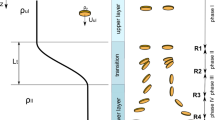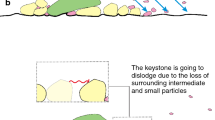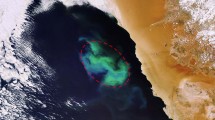Abstract
SINKING velocity is an important ecological factor for many small biological objects such as pollen grains, airborne fruits and microplankton. Elaborate structures are often developed to increase drag and reduce sinking velocity, but their effectiveness cannot be directly investigated because of the difficulties involved in manipulation. The hydrodynamics of such small objects can be investigated, however, by using models of convenient size in highly viscous fluids. We have recently used this method in considering the feasibility of a planktonic mode of life for an extinct bivalve mollusc1 and think the method should interest planktologists, palynologists and others who do not read palaeontological literature.
This is a preview of subscription content, access via your institution
Access options
Subscribe to this journal
Receive 51 print issues and online access
$199.00 per year
only $3.90 per issue
Buy this article
- Purchase on Springer Link
- Instant access to full article PDF
Prices may be subject to local taxes which are calculated during checkout
Similar content being viewed by others
References
Jefferies, R. P. S., and Minton, P., Palaeontology, 8, 156 (1965).
Author information
Authors and Affiliations
Rights and permissions
About this article
Cite this article
MINTON, P., JEFFERIES, R. Hydrodynamic Simulation of Small, Passively-sinking Biological Objects. Nature 209, 829–830 (1966). https://doi.org/10.1038/209829a0
Published:
Issue Date:
DOI: https://doi.org/10.1038/209829a0
Comments
By submitting a comment you agree to abide by our Terms and Community Guidelines. If you find something abusive or that does not comply with our terms or guidelines please flag it as inappropriate.



